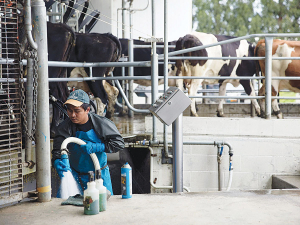Global team cultivates New Zealand premium eating grape vineyard
A multi-cultural team is helping to establish one of New Zealand's largest plantings of premium eating grapes - while learning each other's languages and cultures along the way.
 The Government's decision to allow 500 more overseas dairy workers into the country is a step in the right direction.
The Government's decision to allow 500 more overseas dairy workers into the country is a step in the right direction.
OPINION: The Government's decision to allow 500 more overseas dairy workers into the country is a step in the right direction.
While this won't solve the sector's labour shortage nationally, many farmers will be breathing a sigh of relief.
However, past experience shows that the the Government's green light for more overseas workers doesn't quickly result in more workers landing on farms. The immigration process is cumbersome.
The challenge facing farmers is getting the overseas workers before calving starts in three months time.
Spring calving season kicks off in July in the Waikato and a month later down the country.
However, it may take workers from the Philippines up to six weeks to arrive in New Zealand and receive all the necessary medical checks and paperwork.
Federated Farmers is rightly concerned that administrative hold ups and bureaucracy would see some farmers unable to get workers on the ground in time for calving.
Many farmers may already have connections with workers overseas and getting those workers in will be easier. They must be agile and willing to make this happen super quick.
The labour shortage has been stressful for farmers and their staff over the past few years, thanks to border closures caused by the pandemic.
Many farmers have struggled to provide a competitive roster to prospective and current staff, leading to some managers and sharemilkers bailing out. The stress has been just too great to handle.
The Government had previously approved 300 foreign workers in dairying under an exceptions policy. However, DairyNZ pointed out that it was nowhere near enough to meet the demands on-farm and reduce the current high levels of farmer stress.
Last week's announcement added another 500 to that number. The workers need to be paid at least $28 an hour. DairyNZ has pushed for 1,500 international dairy workers to arrive in time for the 2022 dairy season on June 1.
The 500 extra workers will help reduce some of the pressure on farm teams. However, the sector will continue to advocate for more to be allowed into New Zealand to help address the significant staff shortage. New Zealand needs overseas workers. The Government has recognised this but a streamlined and easy immigration process will help farmers get these 500 overseas workers on farm quickly.
Let's hope Government bureaucracy doesn't throw a spanner in the works.
Could a breakthrough in fermentation create a new multi-million-dollar export market for shiitake mushroom extracts into China?
Meadow Fresh has created the world's first fantasy sports league powered by real cows.
This year, 'Foodie February' sees potatoes take the spotlight as one of New Zealand's most powerful and versatile food heroes.
A multi-cultural team is helping to establish one of New Zealand's largest plantings of premium eating grapes - while learning each other's languages and cultures along the way.
The World Wide Sires National All Day Breeds Best Youth Camp Best All Rounder plaudit has become family affair, with 2026 Paramount Cup winner Holly Williams following in her sister Zara's footsteps.
DairyNZ is giving New Zealand farmers a unique opportunity to gain hands-on governance and leadership experience within the dairy sector.